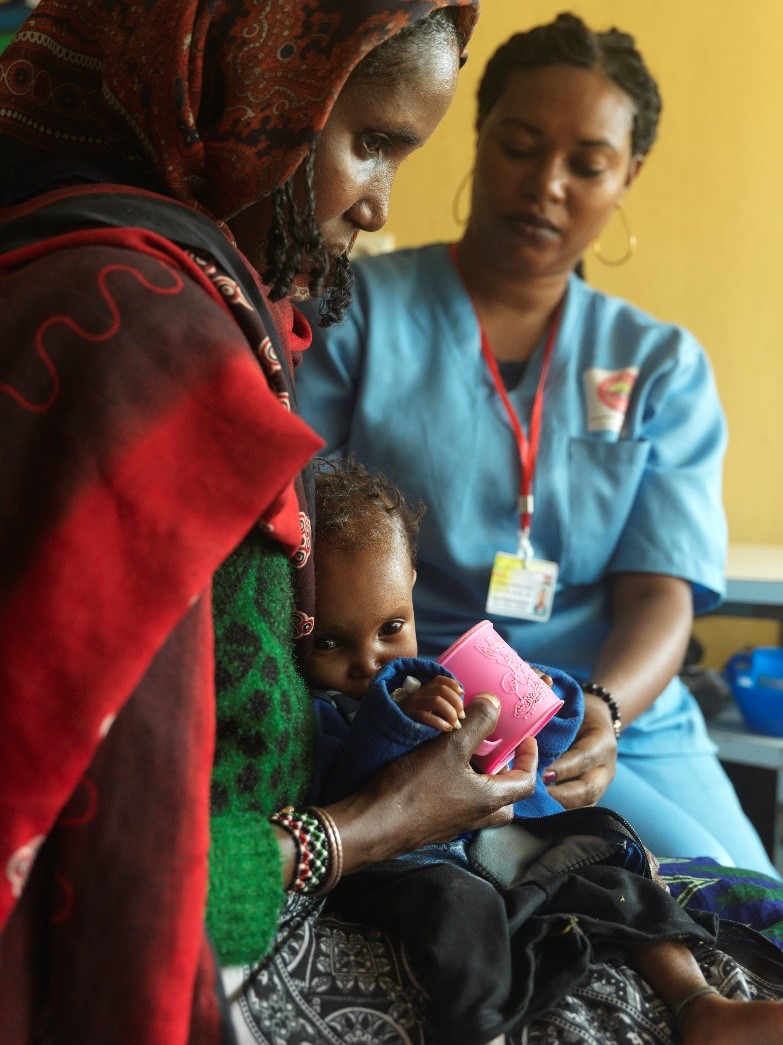London, 21st November – As climate change, economic shocks, rising food prices, and instability from a protracted civil war grip Ethiopia, Action Against Hunger teams are rapidly increasing malnutrition screenings in some of the country’s hardest-to-reach communities. Between January and June 2023, Action Against Hunger’s teams screened more than 665,000 children for acute malnutrition. The organisation is projected to reach over a million by the end of the year. Once acute malnutrition is detected in children, they are then treated in the charity’s programmes in hospitals, stabilisation centres, and out in the community, with around 97 per cent of admitted cases cured.
Ethiopia faces some of the highest hunger rates in the world, with about 18 per cent of the population – or 20.1 million people – in a state of crisis in terms of when and where their next meal will come from. Children are particularly affected, with 40 per cent – or 5.9 million children – under five chronically malnourished. Around 1.2 million children suffer from acute malnutrition, the deadliest form of hunger.
168,000 more children have been screened in comparison to last year due to breakthrough screening methods, expanded operational presence, and increased ability to work safely in Tigray, Ethiopia.
There are a number of nutrition screenings that the organisation has helped to implement across the country. These include mass screenings in camps for displaced people, screenings conducted during measles immunizations, and the Family MUAC approach.
Action Against Hunger’s Nutrition and Health Expert, Muluneh Girma Mekonnen, said: “Currently, the cost of living and inflation is extremely high in Ethiopia, and many face debilitating poverty every day. This creates barriers to accessing food for the most nutritionally at-risk groups, such as children under five and pregnant and lactating women. Not having enough healthy food can have severe consequences on physical and mental development.
“There is very limited access to frontline health workers, who can provide basic nutrition screening, in Ethiopia. This is due to other demands in an overburdened healthcare system as well as people just living too far away to see these professionals.
“By empowering, inspiring and supporting workers and families to screen children under five and refer any cases of acute malnutrition to the nearest health centre, it is possible to improve the numbers of people we’re screening for acute malnutrition. We can then detect cases early, provide the appropriate treatment, and ultimately prevent hospitalisation cases.”
In the Somali region, Action Against Hunger’s mobile teams are meeting mothers like 34-year-old Timiro Abdulahi, who brought her two-year-old daughter Nimo Abdi to the clinic. Both Timiro and her child live in a settlement for displaced people, who typically have some of the highest rates of malnutrition.
Nimo, who had grown weak and lost lots of weight, was quickly diagnosed as severely malnourished. She was immediately treated by our team, who monitored her progress while giving her calorie-dense foods, checking up on her health weekly, and monitoring her nutrition status using MUAC bands. Her mother has expressed so much gratitude that her child is healthy and safe. She’s started to encourage her family and neighbours to attend regular check-ups, too.
These nutrition screenings are saving the lives of children throughout Ethiopia, as far south as the Somali region and as far north as Tigray.
Action Against Hunger teams have been working in Ethiopia since 1985, providing essential clean water, sanitation, and nutrition support to children and families who need it most.
“Although the future holds challenges and uncertainties in ensuring that everyone has access to food and good nutrition, we will continue to mobilise communities to predict, prevent, and treat acute malnutrition – until everyone is free from hunger,”Muluneh continues.


